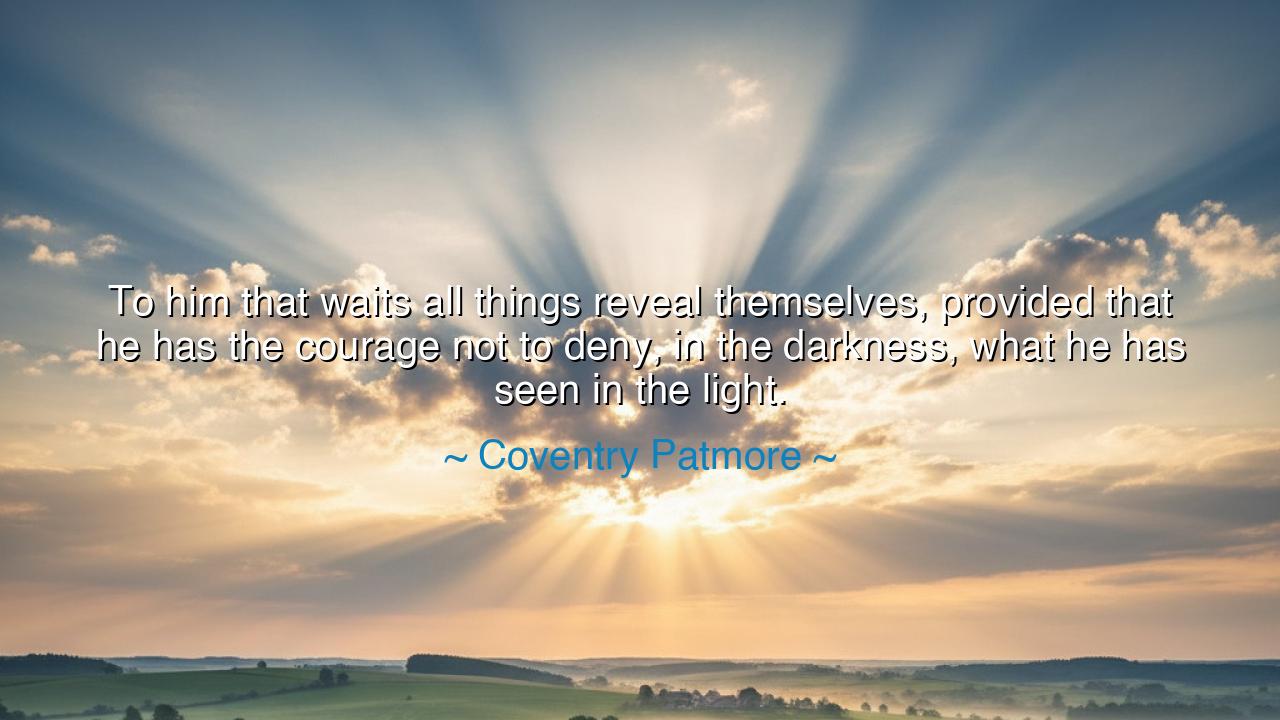
To him that waits all things reveal themselves, provided that he
To him that waits all things reveal themselves, provided that he has the courage not to deny, in the darkness, what he has seen in the light.






The poet Coventry Patmore, whose words glimmer like a lamp in the quiet corridors of the soul, once wrote: “To him that waits all things reveal themselves, provided that he has the courage not to deny, in the darkness, what he has seen in the light.” These words are not mere poetry; they are a law of the spirit, a compass for those who wander through the shadows of doubt and despair. In them lies the ancient truth that faith and patience are not passive virtues, but acts of immense strength. Patmore reminds us that every life, no matter how blessed, passes through darkness—and that the soul’s greatness is revealed not in its moments of light, but in how it holds to truth when that light has faded.
The origin of this insight is found in the life of Patmore himself—a man who walked between the worlds of intellect and devotion. A poet of the Victorian age, he witnessed the rise of reason and the fading of faith, the conflict between spirit and skepticism that haunted his century. Yet, within that tension, he discovered the sacred power of waiting—not as inaction, but as a quiet confidence that the truth one has glimpsed in joy or revelation will remain true even when obscured by suffering or doubt. To “wait,” in his understanding, is to trust that what was once clear will, in time, be clear again; to “have courage” is to resist the temptation to abandon one’s convictions when the world turns cold and silent.
To wait, then, is an act of faith. It is to stand firm when nothing around you confirms your belief, when the garden of your spirit lies barren and the heavens are silent. Every soul that has ever achieved greatness—whether saint, artist, or seeker—has known this trial. Think of Job, who sat upon the ashes of his life, stripped of all he loved, yet refused to curse the God he had known in days of abundance. Though the darkness stretched unending before him, he did not deny what he had once seen in the light. In time, his patience was rewarded, and his soul emerged from the crucible purified and radiant.
The ancients, too, understood this wisdom. The philosophers of the East spoke of the virtue of stillness—of waiting until the waters of the mind grow clear. The Stoics of Greece taught endurance as the highest discipline, that truth reveals itself only to those who persist without complaint. Even in the Christian mystics, such as John of the Cross, we find echoes of Patmore’s meaning in the phrase “the dark night of the soul.” They knew that the darkness is not a punishment but a passage—a necessary silence before revelation returns. The one who can hold fast through it, who remembers the light even when he cannot see it, becomes unshakable.
Patmore’s words also speak to our modern condition, where impatience has become a kind of sickness. We are a people who demand immediate clarity, instant comfort, and quick results. Yet the soul does not unfold on such terms. The mystery of life reveals itself slowly, like dawn breaking over the mountains. Those who cannot wait—who panic at the first shadow—will forever mistake illusion for truth. But those who can sit quietly in uncertainty, trusting in the memory of what they once knew, will in time see the pattern revealed. For every night yields to morning, and every silence hides the whisper of returning light.
Consider the story of Nelson Mandela, who endured twenty-seven years in a prison cell yet never surrendered the vision of freedom that burned within him. In those years of darkness, he could have denied what he had seen in the light—the vision of a just and equal South Africa. But he waited. He trusted that truth, though buried by tyranny, would one day rise. And when freedom finally came, it was not born from rage, but from patience, forgiveness, and courage. Such is the power of those who refuse to abandon their inner light when the outer world grows dark.
So, my child, take this wisdom into your own heart. When darkness descends—when life withholds its answers and the road ahead disappears—remember what you have seen in the light. Remember the goodness you once felt, the purpose that once guided you, the truth that once set your heart aflame. Hold fast to them, even when your senses fail. Wait, not in despair, but in quiet strength, for the light you knew will return. The soul that endures becomes a vessel of wisdom, and patience becomes its crown.
Thus, Coventry Patmore’s words endure as a timeless promise: that nothing true is ever lost, only hidden; that the light we once beheld is not extinguished by the darkness, but merely veiled for a season. Have the courage to believe in what you have already known to be real, even when the night denies it. For the one who waits faithfully will one day see, not the fading memory of light, but its fuller and everlasting dawn.






AAdministratorAdministrator
Welcome, honored guests. Please leave a comment, we will respond soon